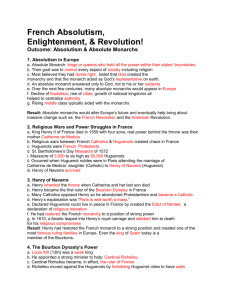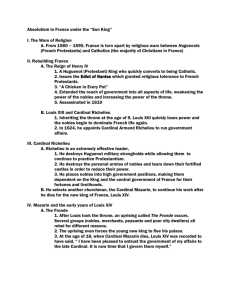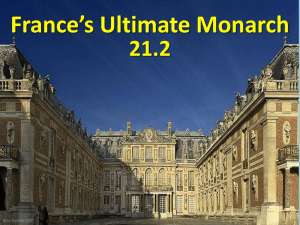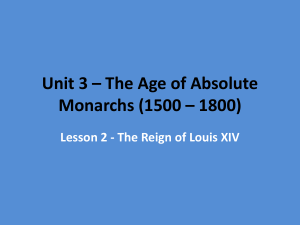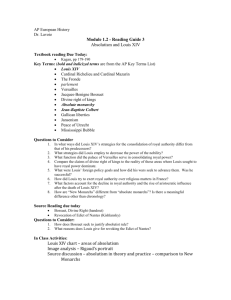Rise of French Absolute Rule
advertisement
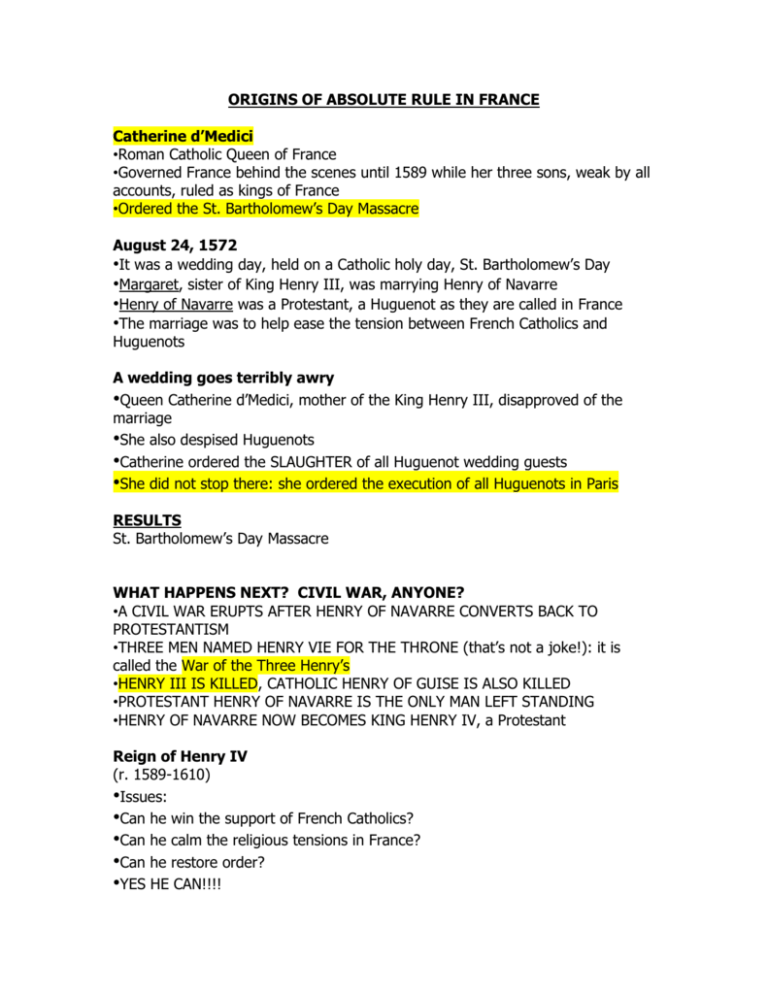
ORIGINS OF ABSOLUTE RULE IN FRANCE Catherine d’Medici •Roman Catholic Queen of France •Governed France behind the scenes until 1589 while her three sons, weak by all accounts, ruled as kings of France •Ordered the St. Bartholomew’s Day Massacre August 24, 1572 •It was a wedding day, held on a Catholic holy day, St. Bartholomew’s Day •Margaret, sister of King Henry III, was marrying Henry of Navarre •Henry of Navarre was a Protestant, a Huguenot as they are called in France •The marriage was to help ease the tension between French Catholics and Huguenots A wedding goes terribly awry •Queen Catherine d’Medici, mother of the King Henry III, disapproved of the marriage •She also despised Huguenots •Catherine ordered the SLAUGHTER of all Huguenot wedding guests •She did not stop there: she ordered the execution of all Huguenots in Paris RESULTS St. Bartholomew’s Day Massacre WHAT HAPPENS NEXT? CIVIL WAR, ANYONE? •A CIVIL WAR ERUPTS AFTER HENRY OF NAVARRE CONVERTS BACK TO PROTESTANTISM •THREE MEN NAMED HENRY VIE FOR THE THRONE (that’s not a joke!): it is called the War of the Three Henry’s •HENRY III IS KILLED, CATHOLIC HENRY OF GUISE IS ALSO KILLED •PROTESTANT HENRY OF NAVARRE IS THE ONLY MAN LEFT STANDING •HENRY OF NAVARRE NOW BECOMES KING HENRY IV, a Protestant Reign of Henry IV (r. 1589-1610) •Issues: •Can he win the support of French Catholics? •Can he calm the religious tensions in France? •Can he restore order? •YES HE CAN!!!! Catholics Are Impressed •Three years after becoming king, Henry realizes he will be more effective if he once again becomes a Catholic •Henry IV hold an elaborate public ceremony in which the Pope himself converts Henry IV to Catholicism •Catholics rejoice but Huguenots know they have nothing to fear because a Protestant all his life, Henry will never persecute them The Edict of Nantes, 1598 • This single document helped Henry IV achieve all three of the goals previously outlined • It was a document granting freedom of religion to Huguenots • It is the first act of toleration in Europe Legacy of Henry IV •He ruled as an effective Absolute Monarch •He was widely respected at home and in Europe •His death shocked everyone: he was stabbed by a crazed Catholic who was angry over his tolerance of Huguenots •He left big shoes to fill for his son and heir to the throne, Louis XIII Louis XIII 1610-1643 •9 years old when he gained power •Developmentally what were you like in 3rd grade? •Appointed a Catholic Cardinal to be his chief minister Cardinal Richelieu •Virtual ruler of France •Iron will and cunning mind •Had two main goals: •Increase power of the King •Make France the strongest state in Europe Richelieu’s 3 Threats •1. End the independence of Huguenot cities •2. Reduce the power of the French Nobility •3. Destroy the Holy Roman Empire Protestant Cities •They are built with High walls surrounding the city…why? •Sept. 11 •How do you think Catholics feel about these fortified cities with high walls? •Suspicious, plotting, planning? •Walls increased religious tensions Richelieu’s Actions 1. Huguenots must take down their walls and disarm: •How does this make the protestants feel? •Venerable, insecure, uncomfortable. •CONSEQUENCE: Protestants begin to leave France and with that take their wealth with them Richelieu’s Actions 2. Remove the power of the French nobility: •Takes away arms/weapons •Fill in motes, NO draw bridges, No walls or gates, NO guards •Consequence: Nobles begin to withhold “aides” to the King Richelieu’s Actions •3. Destroy the Holy Roman Empire •30 years war pitted Protestants vs. Catholics •Richelieu actually supported Protestants why? •Consequences: War costs $$$ / Why are my Catholic $$ going to support a Protestant cause Louis XIV “The Sun King” •Son of Louis XIII •Absolute center of French government •Became King at the age of 5 •Real Power rested in the hands of Cardinal Jules Mazarin Cardinal Mazarin •Brokered peace deal to end the 30 Years War (Treaty of Westphalia) •Made France the strongest nation in Europe •Harsh policies led to the 5 year “Fronde” revolt by nobles Louis XIV 1643-1715 •Mazarin dies when Louis is 23 •Only 5 feet 5 inches tall, but appeared larger than life •Strong dislikes & likes (Cities, Delays) •Liked to eat: 500 cooks, waiters, and other servants worked to satisfy his tastes Louis XIV •Pomp and ceremony glorified Louis and the State “I am the state” – •Most powerful monarch of the French line of Kings Versailles •Located 11 miles outside of Paris •Constructed from 1668-1710 •36,000 workers leveled hills, drained marshes, and built from scaffolding •No walls or moats, just splendid gardens •Small city: 1,000 nobles, 9,000 servants, 226 rooms and 1 King Importance of Versailles •Center of French government •Provided visual display of Louis XIV absolute power •Once proud and rebellious nobles were transfixed on the mystique of royalty •Excited the admiration and envy of other nations Jean Baptiste Colbert •France made many economic gains during Louis’ reign due to Colbert •Minister of Finance •Mercantilism:the system of political economy that sought to enrich the country by restraining imports and encouraging exports Mercantilism •Acquire Gold & Silver •Expand Manufacturing •Encourage Commerce to build a balance in trade •Own Colonies Colbert’s Strategies •High Tariffs on imported goods •Subsidies or grants of money and tax benefits to French businesses •Obtained skilled workers from other countries •Encouraged building of roads & canals •Long hours and low wages for workers •Added 100 warships to the French Navy Colbert’s Achievements •By 1683 France was the industrial leader of Europe •Huguenots had leading roles in the French economy Louis revokes the Edict of Nantes •In 1683 after Colbert’s death Louis revokes the Edict of Nantes which forces 200,000 protestants to leave France •The decision greatly impacts the French economy •Louis also continues to build the Palace at Versailles which was estimated to cost up to 6 out of every 10 francs for every frenchmen War Debt •Louis spends large amounts of money on war and colonialism •Other nations banded together to keep the balance of power in Europe •War of Spanish Succession ended with Louis making many concessions that strengthened Great Britain, Austria, and Prussia Louis XIV Death •Louis was saddened by the suffering his wars had caused •Developed gangrene and died in 1715 •“My child…do not imitate me in the taste that I have had for building or for war. Try, on the contrary, to be at peace with your neighbors…Try to comfort your people, which unhappily I have not done.” –Louis XIV to the future Louis XV on his death bed Louis XIV “The Sun King” •Son of Louis XIII •Absolute center of French government •Became King at the age of 5 •Real Power rested in the hands of Cardinal Jules Mazarin Cardinal Mazarin •Brokered peace deal to end the 30 Years War (Treaty of Westphalia) •Made France the strongest nation in Europe •Harsh policies led to the 5 year “Fronde” revolt by nobles Louis XIV 1643-1715 •Mazarin dies when Louis is 23 •Only 5 feet 5 inches tall, but appeared larger than life •Strong dislikes & likes (Cities, Delays) •Liked to eat: 500 cooks, waiters, and other servants worked to satisfy his tastes Louis XIV •Pomp and ceremony glorified Louis and the State “I am the state” – •Most powerful monarch of the French line of Kings Versailles •Located 11 miles outside of Paris •Constructed from 1668-1710 •36,000 workers leveled hills, drained marshes, and built from scaffolding •No walls or moats, just splendid gardens •Small city: 1,000 nobles, 9,000 servants, 226 rooms and 1 King Importance of Versailles •Center of French government •Provided visual display of Louis XIV absolute power •Once proud and rebellious nobles were transfixed on the mystique of royalty •Excited the admiration and envy of other nations Jean Baptiste Colbert •France made many economic gains during Louis’ reign due to Colbert •Minister of Finance •Mercantilism:the system of political economy that sought to enrich the country by restraining imports and encouraging exports Mercantilism •Acquire Gold & Silver •Expand Manufacturing •Encourage Commerce to build a balance in trade •Own Colonies Colbert’s Strategies •High Tariffs on imported goods •Subsidies or grants of money and tax benefits to French businesses •Obtained skilled workers from other countries •Encouraged building of roads & canals •Long hours and low wages for workers •Added 100 warships to the French Navy Colbert’s Achievements •By 1683 France was the industrial leader of Europe •Huguenots had leading roles in the French economy Louis revokes the Edict of Nantes •In 1683 after Colbert’s death Louis revokes the Edict of Nantes which forces 200,000 protestants to leave France •The decision greatly impacts the French economy •Louis also continues to build the Palace at Versailles which was estimated to cost up to 6 out of every 10 francs for every frenchmen War Debt •Louis spends large amounts of money on war and colonialism •Other nations banded together to keep the balance of power in Europe •War of Spanish Succession ended with Louis making many concessions that strengthened Great Britain, Austria, and Prussia Louis XIV Death •Louis was saddened by the suffering his wars had caused •Developed gangrene and died in 1715 •“My child…do not imitate me in the taste that I have had for building or for war. Try, on the contrary, to be at peace with your neighbors…Try to comfort your people, which unhappily I have not done.” –Louis XIV to the future Louis XV on his death bed




